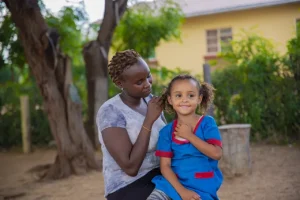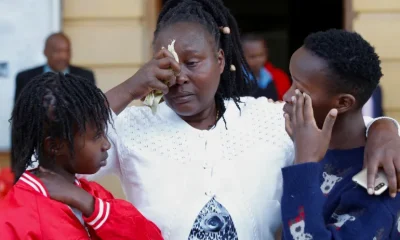News
British Soldiers’ Identities to Be Disclosed to Children They Fathered and Abandoned in Kenya
The children are now seeking legal recognition of paternity, which could entitle them to British citizenship, inheritance rights, and child maintenance payments.

A British High Court has ordered government officials to reveal the identities of 11 soldiers suspected of fathering children in Kenya before abandoning them, marking a historic victory for families who have sought justice for decades.
Sir Andrew McFarlane, president of the family division, granted the unprecedented application compelling the Ministry of Defence, Department for Work and Pensions, and HM Revenue & Customs to disclose names and last known addresses of the military personnel within one month.
The case involves children ranging from infants to adults born in the 1990s, all conceived near the British Army Training Unit Kenya (BATUK) base in Nanyuki, where approximately 10,000 British soldiers rotate through training exercises annually.
The children, described as “mostly of mixed race,” live in communities where such heritage often leads to ostracization, facing significant social and economic challenges.
Their mothers, all Kenyan women from the region around Nanyuki, testified they were in consensual relationships with British soldiers who returned to the UK without taking responsibility for their children.
Many attempted to contact the fathers through various means but received no response, leaving them to raise mixed-race children alone in one of Kenya’s most impoverished regions.

Generica Namoru pictured with her five-year old daughter Nicole. Namoru says she was in a consensual relationship with a UK soldier but he has abandoned her and their child since leaving Kenya. Festo Lang/CNN
Rob George KC, representing the children, told the court that DNA testing confirmed their fathers were not Kenyan, making it highly probable they were British Army personnel or civilians connected to the base.
One child described feeling completely abandoned, saying “The UK doesn’t even know I exist, let alone give me citizenship”.
James Netto, the children’s solicitor who traveled to Kenya in December with DNA testing kits, described the 11 cases as representing “just the tip of the iceberg.”
His investigation revealed a disturbing pattern spanning generations, with BATUK facing renewed scrutiny amid allegations that British soldiers have fathered children with local women and left many without support.
The legal team’s innovative approach involved using the genealogy website Ancestry to match DNA results from Kenyan children with other tests available online.
When potential matches to British soldiers were identified, Netto contacted them through social media, though many blocked further communication attempts.
Court documents revealed a telling pattern in birth timing, with a disproportionate number of children born in October or November, coinciding with the end of nine-month British military deployments that typically begin in January or February.
One case highlighted the profound identity crisis these children face.
A young woman discovered through DNA testing that 31 percent of her genetic heritage relates to England and northwestern Europe, with her closest living relative residing in England, yet she had never known anything about her paternal family or heritage.
The children are now seeking legal recognition of paternity, which could entitle them to British citizenship, inheritance rights, and child maintenance payments. This aspect of the case will be ruled on at a later date.
This legal victory comes amid mounting pressure on British forces over historical misconduct in Kenya.
The long-standing presence of BATUK has been marred by various incidents, including recent arrests of soldiers, and the unresolved murder case of Agnes Wanjiru, whose body was found stuffed in a septic tank near the British base in 2012.
The timing is particularly significant as Kenya has strengthened its legal framework for addressing such cases.
Under a 2021 defense pact, British soldiers can now be sued in Kenyan courts for wrongdoing, offering new avenues for justice that were previously unavailable.
For the affected families in rural Kenya, this court order represents more than legal victory.
It offers hope for recognition, identity, and basic rights that have been denied to them for years.
As one mother holding her five-year-old daughter explained, she simply wanted child support from the British soldier who abandoned them after discovering the pregnancy.
A Ministry of Defence spokesperson maintained that “paternity claims against UK service personnel are a private life issue,” but confirmed the government cooperates with local child support authorities where there are paternity claims, declining further comment while legal proceedings continue.
The case establishes a crucial precedent that could encourage hundreds more similar claims from across Kenya’s British military training areas, where local communities have long struggled with the consequences of relationships between foreign soldiers and local women that ended in abandonment and poverty.
Kenya Insights allows guest blogging, if you want to be published on Kenya’s most authoritative and accurate blog, have an expose, news TIPS, story angles, human interest stories, drop us an email on [email protected] or via Telegram
-

 Grapevine2 weeks ago
Grapevine2 weeks agoRussian Man’s Secret Sex Recordings Ignite Fury as Questions Mount Over Consent and Easy Pick-Ups in Nairobi
-

 News7 days ago
News7 days agoTHE FIRM IN THE DOCK: How Kaplan and Stratton Became the Most Scrutinised Law Firm in Kenya
-

 Investigations1 week ago
Investigations1 week agoMulti-Million Dollar Fraud: Three Kenyans Face US Extradition in Massive Cybercrime Conspiracy
-

 Economy1 week ago
Economy1 week agoIran Demands Arrest, Prosecution Of Kenya’s Cup of Joe Director Director Over Sh2.6 Billion Tea Fraud
-

 Business1 week ago
Business1 week agoA Farm in Kenya’s Rift Valley Ignites a National Reckoning With Israeli Investment
-

 Africa2 weeks ago
Africa2 weeks agoFBI Investigates Congresswoman Ilhan Omar’s Husband’s Sh3.8 Billion Businesses in Kenya, Somalia and Dubai
-

 Grapevine3 days ago
Grapevine3 days agoA UN Director Based in Nairobi Was Deep in an Intimate Friendship With Epstein — He Even Sent Her a Sex Toy
-

 Politics2 weeks ago
Politics2 weeks agoSifuna, Babu Owino Are Uhuru’s Project, Orengo Is Opportunist, Inconsequential in Kenyan Politics, Miguna Says


























